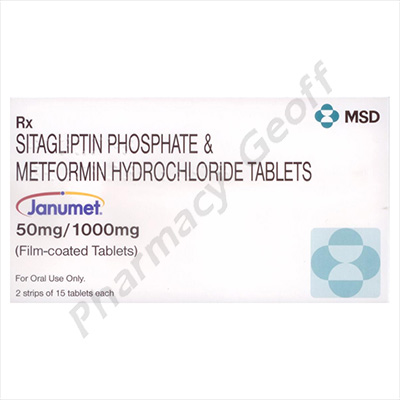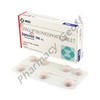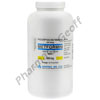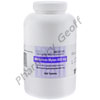What is Janumet (Sitagliptin / Metformin Hydrochloride)
Janumet (Sitagliptin / Metformin Hydrochloride) is used to control blood glucose (sugar) levels in adults with type 2 diabetes. It is used together with diet and exercise in the following ways:
- in patients whose blood glucose levels are not satisfactorily controlled with metformin (a diabetes medicine) used on its own;
- in patients who are already taking a combination of sitagliptin and metformin as separate tablets;
- in combination with a sulphonylurea, a PPAR-gamma agonist such as a thiazolidinedione, or insulin (other types of diabetes medicines) in patients whose blood glucose levels are not satisfactorily controlled with either of these medicines and metformin.
Janumet (Sitagliptin / Metformin Hydrochloride) Dosage and Administration
Janumet (Sitagliptin / Metformin Hydrochloride) is taken twice a day. The dosage required depends on the dose of the other diabetes medicines previously taken. If Janumet (Sitagliptin / Metformin Hydrochloride) is taken with a sulphonylurea or insulin, the dose of the sulphonylurea or insulin may need to be lowered to avoid hypoglycaemia (low blood sugar levels). The maximum dose of sitagliptin is 100 mg a day. Take Janumet (Sitagliptin / Metformin Hydrochloride) with food to avoid any stomach problems caused by metformin.
Janumet (Sitagliptin / Metformin Hydrochloride) Side Effects
Nausea, vomiting, stomach upset, diarrhea, headache, or a metallic taste in the mouth may occur. A tablet may also appear in your stool. If any of these effects last or get worse, tell your doctor or pharmacist promptly. If stomach symptoms return later (after taking the same dose for several days or weeks), tell your doctor right away. Stomach symptoms that occur after the first days of your treatment may be signs of lactic acidosis.
Tell your doctor right away if you have any serious side effects, including: joint pain, signs of kidney problems (such as change in the amount of urine), unusual skin blisters, signs of heart failure (such as shortness of breath, swelling ankles/feet, unusual tiredness, unusual/sudden weight gain).
A very serious allergic reaction to Janumet (Sitagliptin / Metformin Hydrochloride) is rare. However, get medical help right away if you notice any symptoms of a serious allergic reaction, including: rash, itching/swelling (especially of the face/tongue/throat), severe dizziness, trouble breathing.
Janumet (Sitagliptin / Metformin Hydrochloride) does not usually cause low blood sugar (hypoglycemia). Low blood sugar may occur if this drug is prescribed with other diabetes medications, or if you do not consume enough calories from food, or if you do unusually heavy exercise. Talk with your doctor or pharmacist about whether the dose of your other diabetes medication(s) needs to be lowered.
Janumet (Sitagliptin / Metformin Hydrochloride) Warnings and Precautions
Before taking Janumet (Sitagliptin / Metformin Hydrochloride), tell your doctor or pharmacist if you are allergic to sitagliptin or metformin; or if you have any other allergies. This product may contain inactive ingredients, which can cause allergic reactions or other problems. Talk to your pharmacist for more details.
Before using Janumet (Sitagliptin / Metformin Hydrochloride), tell your doctor or pharmacist your medical history, especially of: kidney disease, severe breathing problems (such as obstructive lung disease, severe asthma), liver disease, a disease of the pancreas (pancreatitis), stones in your gallbladder (gallstones), blood problems (such as anemia, vitamin B12 deficiency).
Before having surgery or any X-ray/scanning procedure using iodinated contrast, tell your doctor or dentist about all the products you use (including prescription drugs, nonprescription drugs, and herbal products). You may need to stop Janumet (Sitagliptin / Metformin Hydrochloride) for a short time for the surgery/procedure. Ask your doctor or dentist for instructions before your surgery/procedure.
You may experience blurred vision, dizziness, or drowsiness due to extremely low or high blood sugar. Do not drive, use machinery, or do any activity that requires alertness or clear vision until you are sure you can perform such activities safely. |







